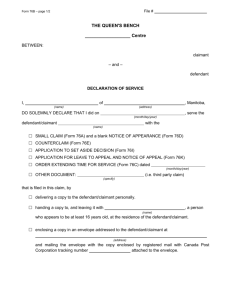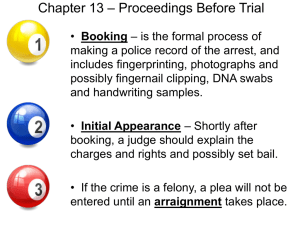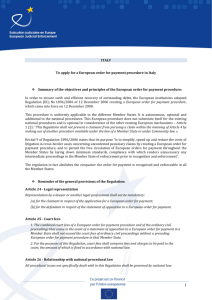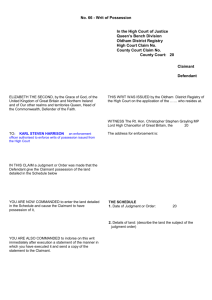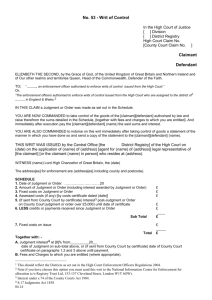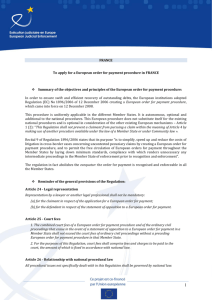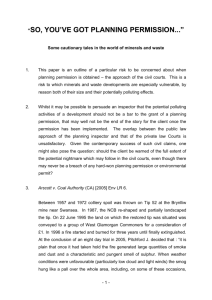POLAND To apply for a European order for payment procedure in
advertisement
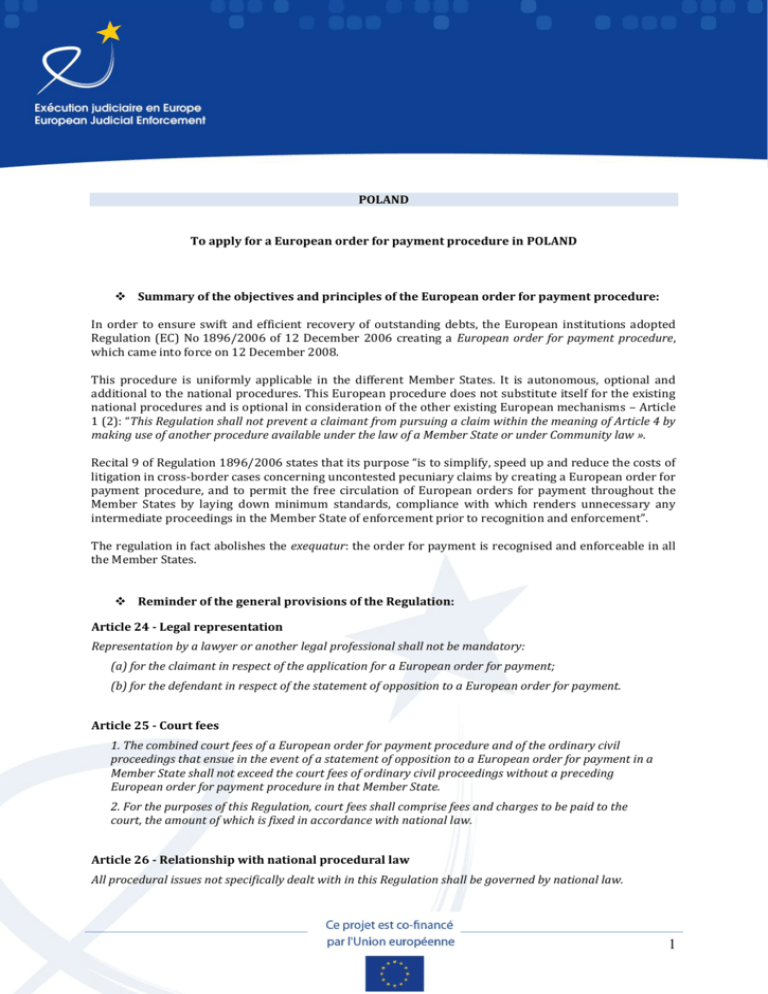
POLAND To apply for a European order for payment procedure in POLAND Summary of the objectives and principles of the European order for payment procedure: In order to ensure swift and efficient recovery of outstanding debts, the European institutions adopted Regulation (EC) No 1896/2006 of 12 December 2006 creating a European order for payment procedure, which came into force on 12 December 2008. This procedure is uniformly applicable in the different Member States. It is autonomous, optional and additional to the national procedures. This European procedure does not substitute itself for the existing national procedures and is optional in consideration of the other existing European mechanisms – Article 1 (2): “This Regulation shall not prevent a claimant from pursuing a claim within the meaning of Article 4 by making use of another procedure available under the law of a Member State or under Community law ». Recital 9 of Regulation 1896/2006 states that its purpose “is to simplify, speed up and reduce the costs of litigation in cross-border cases concerning uncontested pecuniary claims by creating a European order for payment procedure, and to permit the free circulation of European orders for payment throughout the Member States by laying down minimum standards, compliance with which renders unnecessary any intermediate proceedings in the Member State of enforcement prior to recognition and enforcement”. The regulation in fact abolishes the exequatur: the order for payment is recognised and enforceable in all the Member States. Reminder of the general provisions of the Regulation: Article 24 - Legal representation Representation by a lawyer or another legal professional shall not be mandatory: (a) for the claimant in respect of the application for a European order for payment; (b) for the defendant in respect of the statement of opposition to a European order for payment. Article 25 - Court fees 1. The combined court fees of a European order for payment procedure and of the ordinary civil proceedings that ensue in the event of a statement of opposition to a European order for payment in a Member State shall not exceed the court fees of ordinary civil proceedings without a preceding European order for payment procedure in that Member State. 2. For the purposes of this Regulation, court fees shall comprise fees and charges to be paid to the court, the amount of which is fixed in accordance with national law. Article 26 - Relationship with national procedural law All procedural issues not specifically dealt with in this Regulation shall be governed by national law. 1 In order to adopt the national law to requirements of the European order for payment procedure Poland has amended the Code of Civil Proceedings (CCP) regarding the procedure of the issue and enforceability of the European order for payment by introducing new provisions: 1.) Article 505 index 15- Article 505 index 20 CCP- The European order for payment procedure 2.) Article 795 index 6- Article 795 index 7 CCP- Declaration of enforceability of the European order for payment 3.) Article 1153 index 4 -Article 1153 index 6 CCP- Enforceability of the European order for payment issued by national judiciary in the Member States Article 27 - Relationship with Regulation (EC) No 1348/2000 This Regulation shall not affect the application of Council Regulation (EC) No 1348/2000 of 29 May 2000 on the service in the Member States of judicial and extrajudicial documents in civil and commercial matters . Article 28 - Information relating to service costs and enforcement Member States shall cooperate to provide the general public and professional circles with information on: (a) costs of service of documents; and (b) which authorities have competence with respect to enforcement for the purposes of applying Articles 21, 22 and 23, in particular via the European Judicial Network in civil and commercial matters established in accordance with Council Decision 2001/470/EC. Article 29 - Information relating to jurisdiction, review procedures, means of communication and languages 1. By 12 June 2008, Member States shall communicate to the Commission: (a) which courts have jurisdiction to issue a European order for payment; (b) the review procedure and the competent courts for the purposes of the application of Article 20; (c) the means of communication accepted for the purposes of the European order for payment procedure and available to the courts; (d) languages accepted pursuant to Article 21(2)(b). Member States shall apprise the Commission of any subsequent changes to this information. 2. The Commission shall make the information notified in accordance with paragraph 1 publicly available through publication in the Official Journal of the European Union and through any other appropriate means. Contact : eje@europe-eje.eu Cette publication n'engage que son auteur et la Commission n'est pas responsable de l'usage qui pourrait être fait des informations qui y sont contenues. Reminder of the scope of the Regulation: The regulation applies to civil and commercial matters in accordance with Community law. It does not extend to revenue, customs or administrative matters and excludes matrimonial relationships, wills and successions, bankruptcy, judicial arrangements, compositions and analogous proceedings, as well as social security. The regulation applies to cross-border cases, namely cases in which at least one of the parties is domiciled or habitually resident in a Member State other than the Member State of the court seized. The crossborder character is determined at the time of application for a European order for payment. The territorial jurisdiction of the court is determined in accordance with the rules of Community law on jurisdiction, in particular the Brussels I regulation. However, the regulation does make one exception to the Brussels I rules: a claim made against a consumer (a person who has concluded a contract “for a purpose which can be regarded as being outside his trade or profession”) may be brought only before the courts in the Member State in which the consumer is domiciled (which ehassole jurisdiction). The regulation applies only to a pecuniary claim for a specific amount that has fallen due at the time when the application for a European order for payment is submitted and arises from a contract. Accordingly, claims of a non-contractual origin are excluded unless they have been the subject of an agreement between the parties or there has been an admission of debt, or if they relate to liquidated debts arising from joint ownership of property. On the other hand, there is no limitation on the amount of the claim. TO APPLY FOR A EUROPEAN ORDER FOR PAYMENT PROCEDURE IN POLAND I. The application for the order for payment The application is made using standard form A. Read the form in English: http://ec.europa.eu/justice_home/judicialatlascivil/html/epo_form1_en.jsp?txtPageBack=epo_filling_fr_fr. htm&countrySession=2& Read the form in Polish: http://ec.europa.eu/justice_home/judicialatlascivil/html/epo_form1_pl.jsp?countrySession=23&txtPageB ack=epo_filling_pl_pl.htm Competent jurisdiction Member States were invited by the regulation to indicate to the European Commission their national jurisdictions which would be competent to issue an European order for payment procedure. In Poland, the competent courts are district courts and regional courts, whose territorial and substantive jurisdiction is defined in the Code of Civil Procedure of 17 November 1964 (Journal of Laws No 43, item 296, as amended). Substantive jurisdiction is governed by Articles 16, 17 and 461(1), read in conjunction with Article 505(1), of the Code of Civil Procedure, and territorial jurisdiction by Articles 27 to 46 and 461(1), read in conjunction with Article 505(1), of the Code. 3 In Poland territorial jurisdiction is governed by articles 27-46 of the Code of Civil Proceedings. As the principle, the jurisdiction is conferred on the court of the place of the domicile of a defendant. For the cases where the defendant is a company, an action for the pecuniary claim can be submitted to the court of the headquarters or a branch – if a claim has a link with the activity of the headquarters or the branch. Functional jurisdiction depends on an amount of a claim. In civil matters: 1.) in disputes where an amount of a claim does not exceed 75 000 Polish Zloty (PLN)- the claim has to be lodged with a district court 2.) in disputes where an amount of a claim exceeds 75 000 Polish Zloty (PLN)- the claim has to be lodged with a regional court In commercial matters: 1.) in disputes where an amount of a claim does not exceed 100 000 Polish Zloty (PLN) – the claim has to be lodged with a district court 2.) in disputes where an amount of a claim exceeds 100 000 Polish Zloty (PLN)- the claim has to be lodged with a regional court In the case of lodging the application for the European Order for payment with the court which has not jurisdiction, the application shall be transmitted ex officio to the court having jurisdiction. Submission of the application The regulation states that “The application shall be submitted in paper form or by any other means of communication, including electronic, accepted by the Member State of origin and available to the court of origin”. Applications for the European order for payment and other procedural documents may be submitted only in writing. Documents may be lodged with the competent court either in person or by post. Submitting the application at Polish post office is deemed to be equivalent to lodging it to a court ( Article 165 § 2 CCP). The application for the European order for payment involves the payment of the administrative charge proceedings of 5 % of an amount of a claim, no less than 30 Polish zloty (PLN). The court shall reimburse ¾ of the paid fee to the applicant if the order has become final. The payment of the administrative charge proceedings should be done together with the application. If not, the court requests the payment. If the applicant is assisted by a professional attorney (an advocate or a legal counsel) the payment of the administrative charge proceedings has to be done together with the application. Otherwise the application shall be returned without being dealt. Court fees shall be paid in cash or into a court’s bank account. Information on bank accounts of particular courts is available on their Websites. The list of courts is available on the site: www.ms.gov.pl/pl/rejestryi-ewidencje/lista-sadow-powszechnych. Contact : eje@europe-eje.eu Cette publication n'engage que son auteur et la Commission n'est pas responsable de l'usage qui pourrait être fait des informations qui y sont contenues. II. Court examination of the application Once the conditions prescribed for the issue of an order to pay are met, the Court must examine the application as soon as possible and must “normally” decide within a period of 30 days from the lodging of the application. The Court may: . Invite the claimant to complete his application within a given time limit (form B) or to accept the proposal of a partial order to pay (form C); . Reject the application: form D for one of the reasons restrictively listed by the regulation, and which must be notified to the claimant through a specific form. (There is no right of appeal against the rejection of the application.) . Issue a European order for payment using form E. These forms are available on the European judicial atlas in civil matters Website: http://ec.europa.eu/justice_home/judicialatlascivil/html/epo_filling_pl_en.htm?countrySe ssion=23& In the applicant lives in Poland, the service of the request on the claimant is made by registered letter with the acknowledgement of receipt. It could also be served by the court delivery service, the court usher, the judicial officer or the police. At the first service the claimant is advised about the duty of informing the court about each change of the domicile. If the party does not inform the court about the change of its domicile, the next pleadings sent to the previous address and not collected by it will be attached to the case files. In the case specified above the service shall be deemed effected. If the applicant lives in another Member State, the service on the claimant shall be performed pursuant to the provisions of the (EC) Regulation n° 1393/2007 of the European Parliament and of the Council on the service in the Member States of judicial and extrajudicial documents in civil or commercial matters (service of documents), directly by postal service (Article 14) or through a receiving agency which has jurisdiction in the Member State of the addressee. At the first service, the party is advised about the duty of appointing an agent for delivery in Poland (Article 1135 index 5 CCP). If the party has not appointed an agent for delivery in Poland, the next pleadings shall be attached to the case files. In the case specified above, the service shall be deemed effected. If the claimant is a Polish citizen, the service of pleadings may be made through the intermediary of Polish consular channels. III. Service of the European order for payment The order to pay must be served on the defendant in accordance with the national rules of law, by procedures complying with minimal standards (Articles 13 and 14 of the regulation – service or notice with proof of receipt by the defendant/service or notice without proof of receipt by the defendant). The claimant serves a certified copy of form A and form E on the defendant. The form for the opposition (form F) is attached to the notice of service. If the defendant lives in Poland, the service of the European order for payment is made by registered letter with acknowledgement of receipt. At the first service, the defendant is advised about the duty of informing the court about each change of domicile. If the party does not inform the court about the change of its domicile, the next pleadings sent to its previous address and not collected shall be attached to the case files. In this case, the service shall be deemed effected. 5 However, the service of the European order for payment cannot be the substitute delivery. The post noticed by a deliverer and not collected by the defendant shall not be attached to the case files, because there is no information on the advice notice left by a post man, that a post is a judicial one. If the European order for payment has not been delivered by post, the document has to be served by the court delivery service, the court usher, the judicial officer or the police. At this service, the defendant is advised about the duty of informing the court about the change of the domicile. If the party does not inform the court about the change of its domicile, the next pleadings sent to the previous address and not collected shall be attached to the case files. In this case the service shall be deemed effected. If the defendant lives in another Member State, the service shall be performed in accordance with (EC) Regulation n°1393/2007, directly by postal service (art.14) or through the intermediary of a receiving agency. In this case the Polish court shall indicate in the standard form of the request for service, that the service should be performed in accordance with Regulation 1896/2006 by methods laid down in this Regulation. At the first service the party has to be advised about a duty of indicating an agent for delivery in Poland ( art. 1135 index 5 CCP). If the party has not appointed an agent for delivery in Poland, the next pleadings for the party shall be attached to the case files. In the case specified above the service shall be deemed effected. If the defendant is a Polish citizen, the service of documents can be made through the intermediary of Polish consular channels. In the case of cross border service of documents, the addressee may refuse to accept the document to be served if it is not written in, or accompanied by a translation into, either a language which the addressee understands or the official language of the Member State addressed. So, documents must be translated if necessary. But only the entries made by the applicant in the Form A and by the judge in the Form E tare to be translated because the forms are available in the different languages of the European Union on the website of the European Judicial Atlas. In accordance with the Regulation 1393/2007, it is not required that the translation must be certified by a person qualified to do so in one of the Member States. However, in practice, it is advisable to ask a person qualified to translate entries made in the forms. In Poland, the party of the proceedings shall bear the costs of translations. Translations shall be mandated by the court and made by a sworn translator. Sworn translators are qualified to certify translations of documents. A list of sworn translators of the particular Regional Court area can be found on the websites of appropriate Regional Courts and in the court offices. Polish sworn translators’ data base and their addresses can be found on the website of Ministry of Justice (www.ms.gov.pl ). For information only, costs of the translation of one page of a typescript (1125 marks on a page) are: 1.) from Polish language into a foreign language - 36,98 Polish zloty (PLN) gross 2.) from a foreign language into Polish language - 28,29 Polish zloty (PLN) gross IV. Opposition The defendant must send the statement of opposition within 30 days of service of the application, using the form F transmitted to him at the same time as the European order for payment; this time limit may be extended as necessary to allow the statement to arrive. Contact : eje@europe-eje.eu Cette publication n'engage que son auteur et la Commission n'est pas responsable de l'usage qui pourrait être fait des informations qui y sont contenues. In accordance with Polish law, the defendant may lodge the statement of opposition to the European order for payment with the court of origin. The defendant is advised about the possibility of sending a statement of opposition to the European order for payment in the instruction included in the forms. The opposition is lodged by using the standard form F as set out in Annex VI of Regulation 1896/2006, which shall be supplied to the defendant together with the European order for payment. It is possible to lodge the opposition without using the form. The statement of the defendant, in which he contests the European order for payment, shall be necessary in such a situation. The opposition to the order does not require any justification: contesting of the claim is sufficient. The opposition to the European order for payment is to be lodged within 30 days of service thereof. Polish law does not provide any additional time limit for the opposition. To meet the time limit, the defendant has to lodge the opposition with the court of the Member State of origin or send mail at Polish post office, what is tantamount to lodging it with the court ( article 165 § 2 CCP). If the last day for lodging the opposition is a public holiday, the time limit shall end of the expiration of the next working day. The opposition to the European order for payment is not liable to any additional fees. V. Effects of the opposition: Where a statement of opposition is lodged by the defendants, the proceedings continue “before the competent courts of the Member State of origin in accordance with the rules of ordinary civil procedure unless the claimant has explicitly requested that the proceedings be terminated in that event”. - If the claimant has explicitly stated, in the application form, that he opposes the transfer to ordinary civil proceedings: termination of the procedure In the absence of such a statement in the application form, the procedure continues as substantiated proceedings in accordance with the rules for national procedures. If the statement of opposition is entered effectively, the European order for payment shall be null and void and the proceedings shall be continued before the competent court in accordance with the rules of ordinary civil proceedings, unless the claimant has informed the court, that in case of the statement of opposition submitted by the defendant, he does not agree that the case would be transferred to the ordinary civil proceedings. The claimant shall inform the court about it in the annex to the application for the European order for payment. The claimant can make such a statement also later until the moment of the issue of the European order for payment. After effective lodging of the statement of the opposition, the court shall send the copy of the opposition to the claimant. If the claimant has explicitly requested that the proceedings would be terminated in the event of an opposition, the court shall discontinue the proceedings and rule the amount of the costs of the proceedings as in the case of the withdrawal of an application. If the claimant has not explicitly requested that the proceedings would be terminated in the event of an opposition, the proceedings shall continue before the competent court in accordance with the rules of the ordinary civil proceedings. Pursuant to the provisions of Article 505 index 19 § 1-3 CCP, in case of lodging of the opposition to the European order for payment, the order shall be null and void and the court shall hear the case in due course. 7 Assistance or representation by a lawyer is not mandatory in the proceedings before the district court and the regional court. VI. Effects of the absence of a statement of opposition within the time limit of 30 days and any additional period to allow a statement to arrive: Article 18 (1) : If within the time limit laid down in Article 16(2), taking into account an appropriate period of time to allow a statement to arrive, no statement of opposition has been lodged with the court of origin, the court of origin shall without delay declare the European order for payment enforceable using standard form G as set out in Annex VII. The court shall verify the date of service. Article 18 (2) : Without prejudice to paragraph 1, the formal requirements for enforceability shall be governed by the law of the Member State of origin. Article 13 (3) : The court shall send the enforceable European order for payment to the claimant. The requirements indicated in article 18 subparagraph 1 of the EC Regulation have been specified in provisions of articles 795 index 6- 795 index 7 CCP. After the expiration of the time limit for lodging of the opposition, the court of the Member State of origin shall declare ex officio the European order for payment enforceable. The declaration of enforceability of the European order for payment has the form of the ruling on a declaration of enforceability of the European order for payment. The ruling shall be brought to the notice of the claimant as well as of the defendant. The ruling may be reviewed by the parties of the proceedings. The action against the ruling is to be lodged within 7 days of service thereof. To meet the date the party has to lodge the appeal with the court or send mail at Polish post office, what is tantamount to lodging of the pleading with the court ( article 165 § 2 CCP). If the last day for lodging of the appeal is the public holiday, the time limit shall end of the expiration of the next working day. The late appeal shall be rejected by the court. After validity of the ruling on a declaration of enforceability of the European order for payment, the court shall declare the European order for payment enforceable by using standard form G set out in Annex VII of Regulation. The court shall send the form G to the claimant. VII. Review of the order to pay (article 20): Article 20 - Review in exceptional cases 1. After the expiry of the time limit laid down in Article 16(2) the defendant shall be entitled to apply for a review of the European order for payment before the competent court in the Member State of origin where: (a) (i) the order for payment was served by one of the methods provided for in Article 14, and (ii) service was not effected in sufficient time to enable him to arrange for his defence, without any fault on his part, Contact : eje@europe-eje.eu Cette publication n'engage que son auteur et la Commission n'est pas responsable de l'usage qui pourrait être fait des informations qui y sont contenues. or (b) the defendant was prevented from objecting to the claim by reason of force majeure or due to extraordinary circumstances without any fault on his part, provided in either case that he acts promptly. 2. After expiry of the time limit laid down in Article 16(2) the defendant shall also be entitled to apply for a review of the European order for payment before the competent court in the Member State of origin where the order for payment was clearly wrongly issued, having regard to the requirements laid down in this Regulation, or due to other exceptional circumstances. 3. If the court rejects the defendant's application on the basis that none of the grounds for review referred to in paragraphs 1 and 2 apply, the European order for payment shall remain in force. If the court decides that the review is justified for one of the reasons laid down in paragraphs 1 and 2, the European order for payment shall be null and void. In Poland, with regard to Article 20(1) of the Regulation, debtor protection takes the form of arrangements for rescheduling the time limit for submitting a statement of opposition to a European order for payment. This area will be governed by Part One, Title VI, Chapter 5 “Non-compliance with time limits and arrangements for rescheduling” (Article 167-172 of the Code of Civil Procedure). Under these rules a letter with an application for rescheduling must be lodged with the court in which the proceedings were to take place no more than one week after the reason for non-compliance with the time limit ceases to apply. This letter should set out the grounds for the application. The party should take procedural action when the application is lodged. Where a time limit has not been complied with and a period of one year has elapsed, rescheduling will be authorized only in special cases. In principle, the fact of lodging an application for rescheduling does not cause proceedings, or enforcement of a judgment, to be suspended. With regard to Article 20(2) of the Regulation, the rules laid down in Article 505(20) of the Code of Civil Procedure apply. The application should meet the requirements of a reply brief and the grounds for annulling the European order for payment must be indicated. The competent court is the court which issued the order. Before annulling the European order for payment the court must hear the applicant or require him to make a statement in writing. After making the statement by the claimant or after hearing the claimant during the sitting or in the case when the statement has not been made and after time limit for making such a statement, the court shall issue a ruling on the abolition of the European order for payment. The ruling may be appealed by the parties of the proceedings. VIII. Enforcement of the order for payment Article 21 - Enforcement 1. Without prejudice to the provisions of this Regulation, enforcement procedures shall be governed by the law of the Member State of enforcement. A European order for payment which has become enforceable shall be enforced under the same conditions as an enforceable decision issued in the Member State of enforcement. 2. For enforcement in another Member State, the claimant shall provide the competent enforcement authorities of that Member State with: 9 (a) a copy of the European order for payment, as declared enforceable by the court of origin, which satisfies the conditions necessary to establish its authenticity; and (b) where necessary, a translation of the European order for payment into the official language of the Member State of enforcement or, if there are several official languages in that Member State, the official language or one of the official languages of court proceedings of the place where enforcement is sought, in conformity with the law of that Member State, or into another language that the Member State of enforcement has indicated it can accept. Each Member State may indicate the official language or languages of the institutions of the European Union other than its own which it can accept for the European order for payment. The translation shall be certified by a person qualified to do so in one of the Member States. 3. No security, bond or deposit, however described, shall be required of a claimant who in one Member State applies for enforcement of a European order for payment issued in another Member State on the ground that he is a foreign national or that he is not domiciled or resident in the Member State of enforcement. At this stage (enforcement proceedings), the judicial officer does not serve the European order for payment to the party against which it has been made for it to be enforced. IX. Stay, limitation or refusal of enforcement On certain conditions the defendant may obtain a stay, limitation or refusal of enforcement of the “European order for payment” by the “competent court in the Member State of enforcement” (article 22(1)). The limitation or stay can be obtained only if an application for review has been made to the original court. The competent court or authority in the Member State of enforcement may either limit the enforcement proceedings to protective measures, or make enforcement conditional on the provision of such security as it may determine or, under exceptional circumstances, stay the enforcement proceedings. - The refusal may be obtained only if the European order for payment is irreconcilable with an earlier decision given between the same parties and involving the same cause of action, and if the irreconcilability could not have been raised as an objection in the court proceedings in the Member State of origin. In Poland, the judicial officer and the court have jurisdiction for ruling a stay, limitation or refusal of enforcement in circumstances specified in the provisions of Polish Code of Civil Proceedings . The decision shall be issued: 1.)on the application of the creditor or the debtor lodged with the judicial officer 2.)on the application of the creditor or the debtor lodged with the court 3.)ex officio by the judicial officer 4.)ex officio by the court When the ruling is issued by the judicial officer- the issue of the ruling by the judicial officer is not liable to any costs. When the ruling is issued by the court- the payment of the administrative charge proceedings Contact : eje@europe-eje.eu Cette publication n'engage que son auteur et la Commission n'est pas responsable de l'usage qui pourrait être fait des informations qui y sont contenues. is regulated by the provisions of The Law on court fees in civil matters of 28 July 2005 (J.L. 167, item.1398, consolidated text of 27 April 2010 J.L. Nr 90, item 594). Pursuant to article 3 subparagraph 1 of the Law mentioned above the pleading is liable to a payment of the administrative charge proceedings if the provision of this law foresees collecting it. January 2012 11
